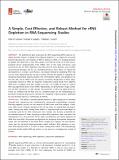A Simple, Cost-Effective, and Robust Method for rRNA Depletion in RNA-Sequencing Studies
Author(s)
Culviner, Peter H.; Guegler, Chantal K.; Laub, Michael T.
DownloadPublished version (1.214Mb)
Publisher with Creative Commons License
Publisher with Creative Commons License
Creative Commons Attribution
Terms of use
Metadata
Show full item recordAbstract
The profiling of gene expression by RNA sequencing (RNA-seq) has enabled powerful studies of global transcriptional patterns in all organisms, including bacteria. Because the vast majority of RNA in bacteria is rRNA, it is standard practice to deplete the rRNA from a total RNA sample such that the reads in an RNA-seq experiment derive predominantly from mRNA. One of the most commonly used commercial kits for rRNA depletion, the Ribo-Zero kit from Illumina, was recently discontinued abruptly and for an extended period of time. Here, we report the development of a simple, cost-effective, and robust method for depleting rRNA that can be easily implemented by any lab or facility. We first developed an algorithm for designing biotinylated oligonucleotides that will hybridize tightly and specifically to the 23S, 16S, and 5S rRNAs from any species of interest. Precipitation of these oligonucleotides bound to rRNA by magnetic streptavidin-coated beads then depletes rRNA from a complex, total RNA sample such that ∼75 to 80% of reads in a typical RNA-seq experiment derive from mRNA. Importantly, we demonstrate a high correlation of RNA abundance or fold change measurements in RNA-seq experiments between our method and the Ribo-Zero kit. Complete details on the methodology are provided, including open-source software for designing oligonucleotides optimized for any bacterial species or community of interest.
IMPORTANCE The ability to examine global patterns of gene expression in microbes through RNA sequencing has fundamentally transformed microbiology. However, RNA-seq depends critically on the removal of rRNA from total RNA samples. Otherwise, rRNA would comprise upward of 90% of the reads in a typical RNA-seq experiment, limiting the reads coming from mRNA or requiring high total read depth. A commonly used kit for rRNA subtraction from Illumina was recently unavailable for an extended period of time, disrupting routine rRNA depletion. Here, we report the development of a “do-it-yourself” kit for rapid, cost-effective, and robust depletion of rRNA from total RNA. We present an algorithm for designing biotinylated oligonucleotides that will hybridize to the rRNAs from a target set of species. We then demonstrate that the designed oligonucleotides enable sufficient rRNA depletion to produce RNA-seq data with 75 to 80% of reads coming from mRNA. The methodology presented should enable RNA-seq studies on any species or metagenomic sample of interest.
Date issued
2020-04Department
Massachusetts Institute of Technology. Department of BiologyJournal
mBio
Publisher
American Society for Microbiology
Citation
Culviner, Peter H. et al. "A simple, cost-effective, and robust method for rRNA depletion in RNA-sequencing
studies." mBio 11, 2 (April 2020): e00010-20 © 2020 Culviner et al.
Version: Final published version
ISSN
2150-7511